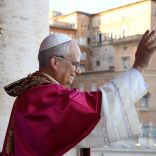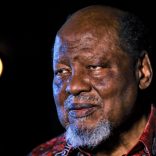Mozambique's President calls for consolidation of "shared citizenship" in CPLP countries
Nyusi demands implacable fight against corruption

Rádio Moçambique (File photo)
Corruption is a cancer that wrecks society and blocks development, President Filipe Nyusi warned on Friday.
Speaking at a meeting in Maputo with senior civil servants, including national inspectors, permanent secretaries, national directors, and heads of procurement, Nyusi stressed that an implacable fight against corruption is one of the top priorities of the government.
The meeting took place under the motto “For an Honest Public Administration, Opposed to Corruption and Oriented towards Results”, and was intended to debate the role of senior civil servants in implementing public policies and ensuring transparency in management.
Echoing the speech he made at the opening last month of the 11th Congress of the ruling Frelimo Party, he said that corruption “is the greatest challenge that we face”, and had reached levels that are “very high and frightening”.
The President cited alarming figures. He said that from January 2017 to the present, the Central Office for the Fight Against corruption (GCCC) has handled more than 450 cases involving such figures as members of the government, diplomats, mayors, district administrators, and directors of public companies.
In 2016, the total number of cases of all kinds handled by the GCCC was 1,235, a significant rise on the 1,051 cases of 2015. The amount lost to the state through embezzlement in 2016 was over 459 million meticais (over 7.5 million US dollars), and Nyusi feared this could be an under-estimate.
“There should be no doubt at all”, he stressed. “The fight against corruption is the most urgent and crucial of tasks. We must unite to free Mozambique of this evil once and for all”.
Corruption was a vicious cycle. “People are corrupt because they are poor, and they are poor because of corruption or of bad governance”, said Nyusi. Breaking this vicious cycle depended on “this body of intermediate leaders” – the senior civil servants he was addressing. The “paradigm shift” must come from them.
Although at an individual level, asking for a petty bribe might not seem damaging, “the cumulative effect is exactly the opposite”, he said.
Whether it was a “commission” of a billion dollars or a bribe of fifty meticais, corruption would not be tolerated, Nyusi insisted. “My government, which is you, must be implacable. Don’t expect any other guideline”.
But on its own, without the bodies of the administration of justice, the government could do nothing. “We all need to go at the same speed, in the public and the private sectors”, he stressed.
“The priority in this cycle of governance is to serve the people”, declared Nyusi. “Acts of corruption and bad governance must be fought against energetically. The responsibility must be not just that of the President, because the people are not just my boss – they employ all the managers of the public sector”.
“Each and every one of us, as public officials, are answerable to the Mozambican people”, he said – and that meant everyone, from the most senior minister in the government to the newest recruit to the police force or the health service.
Any one of them – a health worker who illicitly sold medicines, a teacher who sold exam results, an immigration official who demanded bribes – should be hauled before the courts. “And you are the ones who must hold them responsible”, Nyusi told his audience.
There must be no compromises, the President said. “Let us take pride in transforming Mozambique into a country free of corruption, just as we made it a country free of colonialism, and free of land mines”.
Despite the results achieved so far in the public sector reform, he continued, there was still a lot to be done in inclusive governance, including eliminating excessive red tape, “increasing the speed and ease with which people have access to public services”.
Cutting down on red tape would also improve the business environment. “These efforts are part of our belief in the values of integrity, transparency and responsibility”, he stressed. “We are moving towards a governance where procedures are clear and open, where the public knows who takes decisions and where those who make mistakes are held responsible”.
Nyusi expected each and every leading figure to draw up an anti-corruption plan of action, and to establish mechanisms that would contribute to reducing red tape. Each state institution should boost the capacities of each of its staff to fight against corruption, he added, and the budgets for each sector should include a line for the fight against corruption.
The Friday meeting, with the people who were “the backbone of the public administration”, said Nyusi, “is a superb opportunity to discuss the formulas necessary to satisfy the needs of the people”.
“We are aware of the limitations of our resources, and so the few resources available must be used rationally”, he declared.













Leave a Reply
Be the First to Comment!
You must be logged in to post a comment.
You must be logged in to post a comment.